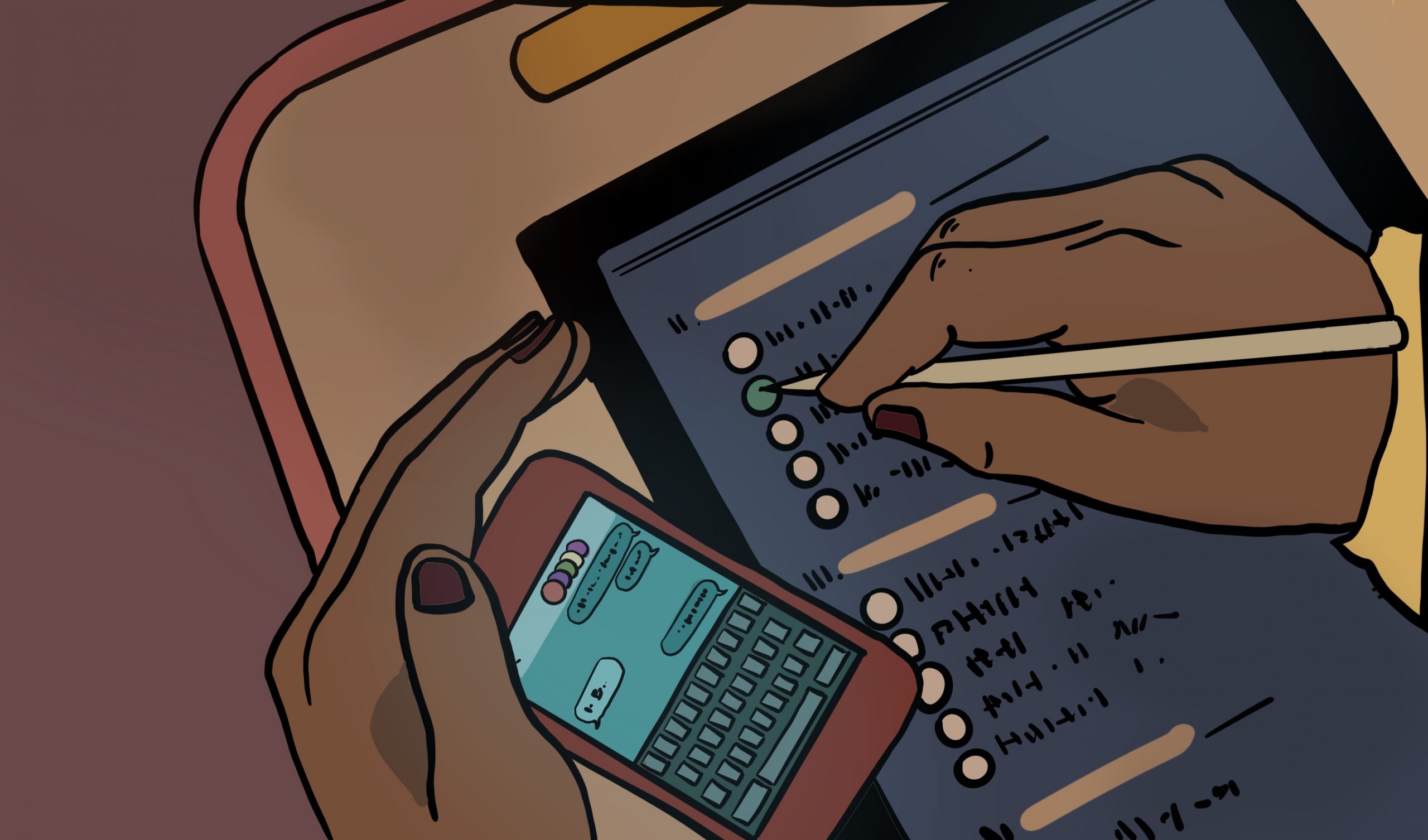Now that students are studying remotely, chatting about class content with your classmates over instant messaging has possibly become even more popular than it was pre-pandemic. And as expected, this comes with its caveats.
Academic honesty is at the forefront of concerns for many students using group chats as a form of communication with classmates. Breaching York’s Senate Policy on Academic Honesty comes with a plethora of consequences, and the common theme for students is whether one student could drag the rest down for using a chat to cheat.
Associate Dean of Teaching & Learning Professor Anita Lam clarifies what would be a breach of academic honesty.
“In group chats, students need to be aware of the following: they should not falsely claim credit for ideas that are not their own, by presenting another’s work as theirs. This can be tied to plagiarism, where a student may plagiarize another student’s ideas,” Lam says.
An anonymous student explains that their classmates are taking advantage of the situation and trying to set up WhatsApp groups and Discord groups to cheat.
She adds: “Because this happens in a group chat, usually outside of course time and eClass, it will be difficult for instructors to know who is plagiarizing whom if identical student papers/answers are submitted for the same course.”
One student, who wishes to remain anonymous, says they are annoyed by the use of instant messaging applications to cheat.
“We use group chat so we can help each other when we have questions on homework or terms we don’t understand,” they say. However, the student explains that their classmates are taking advantage of the situation and “try to set up WhatsApp groups and Discord groups to cheat.”
As students are working primarily remotely, group chats are the main source of communication for group work and socializing. Regarding this, the anonymous student says: “It’s tough for a lot of students. Especially since we can’t interact with others in class, group chats are really important to some of us to keep us sane.”
They add: “Now we have to worry about a few students who are here simply to use others. We also overthink when helping others because we don’t know if what we’re doing counts as cheating or not.”
This student’s biggest concern is how this is going to affect them if they are found to be part of a chat where one student is breaching academic honesty.
When asked about who would be held responsible for practicing academic dishonesty, Lam clarifies that this depends on the case.
“If the group chat was seemingly set up for the purpose of cheating during a midterm or final exam, then all students in the chat will be asked to participate in an exploratory meeting,” Lam says. “If the group chat was set up to help students study but a few students have misused the chat to engage in academically dishonest behaviours, then the investigation will focus on identifying specific group members for disciplinary action.”
If the group chat was seemingly set up for the purpose of cheating during a midterm or final exam, then all students in the chat will be asked to participate in an exploratory meeting.
Lam says that all faculties have their own process when students are found to be breaching academic honesty, but in Liberal Arts & Professional Studies (LA&PS), the process “begins when an instructor suspects a student of a breach of academic honesty.”
The program, department, or school discusses the suspected breach by scheduling an exploratory meeting with the suspected student(s). Then evidence will be presented and the student(s) in question have an opportunity to explain their side of the story.
Lam adds that the student accused will have the opportunity to take responsibility for their actions at that time, and “a resolution will be determined at the end of the meeting.”
When asked how they intend to avoid academic dishonesty in their course, the anonymous student says they are usually the one to create the group chat, and will kick cheaters out.
“Usually we try to address it in the beginning and let people know we don’t want to cheat in this chat,” they say. “If you see people cheating you should leave. The rules are clear.”
A letter about academic honesty been translated into 10 other languages in an effort to ensure all students have access to it.
Lam adds that if students are unclear about what work they can collaborate on, they should speak to their instructor to avoid misunderstandings.
“If the assignment or test is meant to be completed individually, then any work that happens during a group chat can be deemed an unauthorized collaboration. A group chat in real time during a test can be interpreted by instructors as a potential instance of academic dishonesty,” Lam says.
Ensuring students understand the rules and repercussions of breaching the Senate Policy on Academic Honesty, Lam and Associate Dean of Students Professor Michele Johnson have created a letter to students in LA&PS about academic honesty.
The letter has been translated into 10 other languages in an effort to ensure all students have access to it. According to Lam, instructors volunteered their time to translate the letter into the various languages, but they are hoping to expand how many languages the letter is available in.
“I would be delighted if students would like to volunteer to translate the letter into their own language. All student translations can be added to the webpage,” Lam says.




